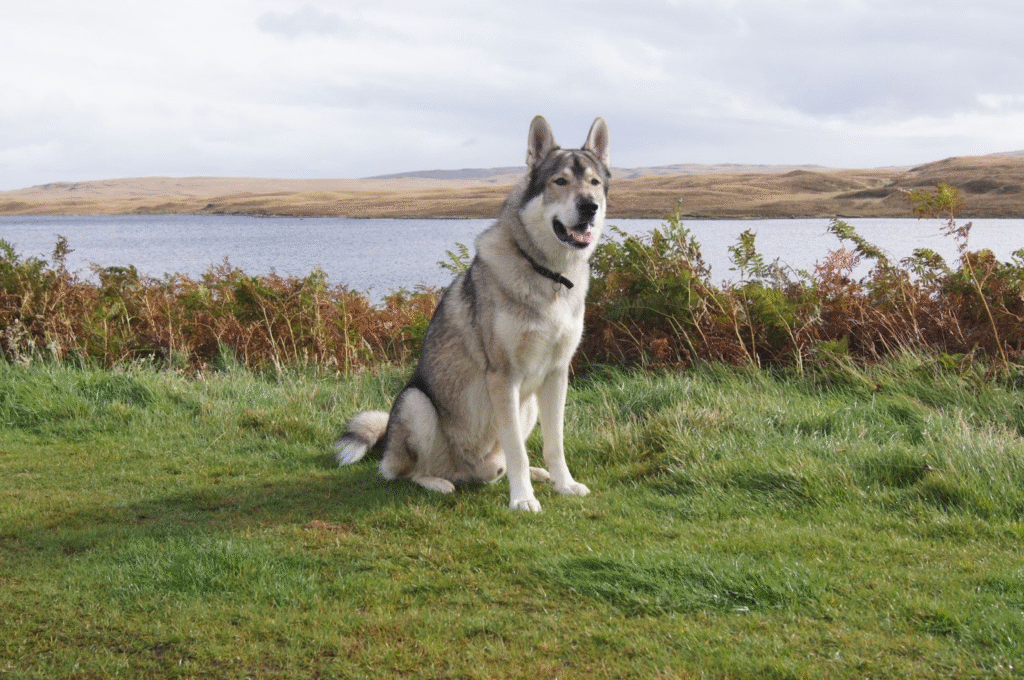Tamaskan Dog Temperament: What to Expect
Last Updated on 25 September 2025

The tamaskan is one of the most eye-catching modern breeds, instantly recognizable for its wolf-like coat, tall frame, and alert expression.
Despite their striking appearance, tamaskans are known for their balanced, family-friendly personalities. In recent years, this breed has gained significant popularity with active families and dog enthusiasts who want a companion that’s intelligent, hardworking, and affectionate.
If you’re considering this breed, understanding their temperament is key to deciding whether they’ll fit into your home and lifestyle. This guide breaks down what you can expect from a tamaskan’s personality, including how they interact with kids, other pets, and strangers, and whether they’re suited for first-time dog owners.
General Personality of a Tamaskan
At its core, a tamaskan dog is loyal, intelligent, and deeply social. Unlike more independent northern breeds, they thrive on companionship and tend to follow their family’s lead closely. They are happiest when they can be part of everyday routines, whether that’s joining in on outdoor activities, playing in the yard, or simply resting nearby indoors.
Because of their pack-oriented background, tamaskans are rarely aloof. They often seek out attention and physical closeness, showing affection openly. This makes them highly rewarding companions but also means they dislike being left alone for long stretches. Without enough interaction, they may become anxious or develop destructive habits.
Overall, the tamaskan’s personality blends the steadiness of a working dog with the warmth of a family pet, making them adaptable to households that can match their social and mental needs.
How Energetic Are Tamaskans?
This breed has a high energy level. Descended from working dogs such as huskies and German shepherds, tamaskans require daily exercise to stay happy and healthy. A short walk around the block won’t cut it. They require long walks, hiking, running, or even agility training to burn off energy.
Without enough stimulation, a tamaskan may become restless and engage in unwanted behaviors like digging or chewing. For active households that enjoy outdoor adventures, their energy is a bonus rather than a burden.
Are Tamaskans Easy to Train?
Tamaskans are highly intelligent, which makes them quick learners. They respond best to positive reinforcement tools such as treats, praise, and play. Their eagerness to learn and desire to work with people mean they excel in obedience, agility, and even search-and-rescue style training.
However, intelligence comes with independence. If training sessions become repetitive or harsh, a tamaskan may lose interest. Consistency, patience, and variety are key to keeping them engaged.
Social Nature of a Tamaskan: Kids, Pets, and Strangers
Tamaskans are generally good with children. Their gentle nature and tolerance make them suitable companions for families with young kids, provided play is supervised and respectful. Early socialization is important to help them adapt to different people and situations.
These dogs also gel well with other dogs, as they are naturally pack-oriented. They can also live peacefully with cats and smaller animals if introduced early, though their prey drive may surface without proper training.
Do Tamaskans Make Good Guard Dogs?
Despite their wolf-like looks, tamaskans are not natural guard dogs. They are more likely to welcome visitors than to act aggressively. This may come off as a surprise to some, but it is even mentioned in Tamaskan guides from reliable sources like Dog Academy.
While they may alert you with a bark, they are better suited as companions than protectors. Their temperament leans toward friendliness rather than suspicion.
Tamaskan Dog Temperament: A Summary
Every dog has quirks, and the tamaskan is no exception. While much of their personality is shaped by training and socialization, certain traits appear consistently in the breed.
- Affectionate: They bond deeply with families and often seek physical closeness.
- Playful: They enjoy games and interactive activities, making them entertaining companions.
- Sensitive: Harsh corrections can upset them, so gentle, positive handling works best.
- Adaptable: While happiest in larger spaces, they can adjust to smaller homes if exercise needs are met.
Together, these traits create a dog that feels both energetic and emotionally connected, making the tamaskan a breed that thrives in households willing to engage with them daily.
Finding the Right Tamaskan for Your Home
The tamaskan is best for owners who have time for daily exercise and mental stimulation, and want a loyal, social dog that thrives on family interaction. If you live a sedentary lifestyle or spend long hours away from home, this may not be the right match. However, for active households, the tamaskan is an ideal addition.
Once you’re certain that a tamaskan can fit into your everyday schedule, take time to learn more about the breed in general. With the right care and commitment, these dogs can grow into lifelong companions that bring energy, loyalty, and warmth to your family.